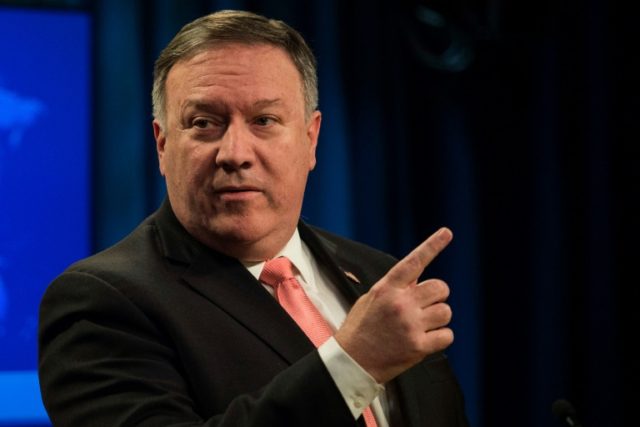South Korea’s Foreign Minister Kang Kyung-wha told her country’s National Assembly on Thursday that the communist regime in North Korea requested to postpone scheduled talks between dictator Kim Jong-un’s top aide Kim Yong-chol and U.S. Secretary of State Mike Pompeo.
The State Department confirmed on Wednesday that the talks, scheduled to occur in New York on Thursday, would happen at a later date, citing scheduling conflicts. President Donald Trump himself addressed the issue during a press conference this week, suggesting that denuclearization talks between the two countries have continued in a positive direction.
The South Korean newswire service Yonhap reported on Thursday that Kang revealed in remarks that day that North Korea had canceled the talks, not Washington.
“The U.S. explained to us that it received a notification from the North Korean side to put off (the talks),” Kang reportedly said, adding that she had not personally talked to Pompeo yet but expected to soon. She also noted that she expects no significant changes in U.S. policy following Tuesday’s midterm elections.
“There has been bipartisan support (on Capitol Hill) for the South Korea-U.S. alliance and a peaceful resolution to the North Korean nuclear issue,” she told the Assembly.
The State Department issued a statement Wednesday noting only that the talks would not occur this week, with little explanation.
“We will reconvene when our respective schedules permit,” the statement said. “Ongoing conversations continue to take place. The United States remains focused on fulfilling the commitments agreed to by President Trump and Chairman Kim at the Singapore Summit in June.”
Trump personally told reporters “that meeting is going to be rescheduled” during remarks Wednesday, expressing optimism that North Korea would agree to a denuclearization plan satisfactory to Washington.
“We’re going to change it because of trips that are being made,” Trump suggested, according to South Korea’s JoongAng Ilbo. He added that “there’s no rush whatsoever” in resolving the nuclear issue, as the United States has no intention of loosening sanctions currently imposed on Pyongyang, one of the strictest sanctions regimes imposed on any country in history.
“Now, I’d love to take the sanctions off,” Trump noted, “But they have to be responsive, too. It’s a two-way street.” He added he was “very happy” with the current state of the bilateral relationship.
The State Department insisted that the meeting postponement was a “timing” issue and not a substantive one during a regular press briefing Wednesday.
“We will reconvene when our respective schedules permit. Ongoing conversations continue to take place,” spokesman Robert Palladino told reporters. “[S]chedules change. Schedules change all the time, in fact. Sometimes we make these things public. Sometimes, as our schedules change, they’re not public. This is a case, we’re dealing with purely a scheduling issue, and it’s as simple as that.”
He went on to refuse to answer questions regarding whose schedule had caused the problem, concluding, “there’s nothing additional to provide here” and saying of talks generally, “we’re in a pretty good place right now.”
North Korean state media have not addressed the meeting or its cancellation. It typically does not allow North Koreans to know of such meetings until much after they occur, but will occasionally publish anti-American screeds when incensed about certain government behavior.
The United States announced the resumption of small-scale military exercises this week with South Korea, typically an issue that triggers outrage in Pyongyang. In the immediate aftermath of that news, however, North Korean state media instead complained once more about sanctions, insisting the Trump administration must lift them to ensure North Korean compliance with international law.
That compliance is reportedly far from reality. A report published by the monitor site 38 North last week revealed evidence that the communist government has continued mining uranium even as it vows to shut down its nuclear program completely. Chosun Ilbo, which reported on the new evidence, noted that overhead satellite images indicate significant growth in waste deposits at known uranium mining facilities in the country, suggesting recent use.

COMMENTS
Please let us know if you're having issues with commenting.